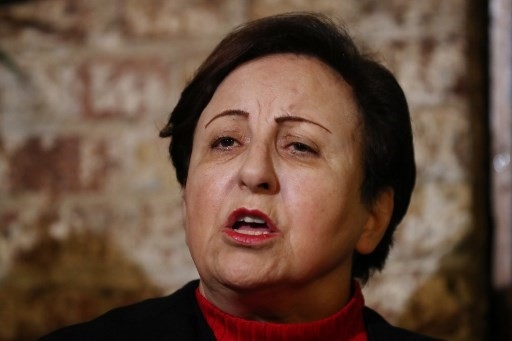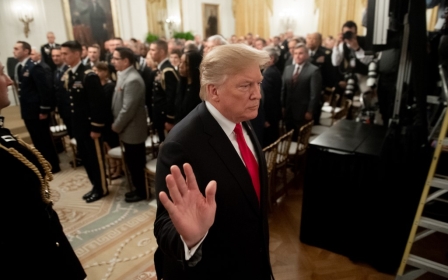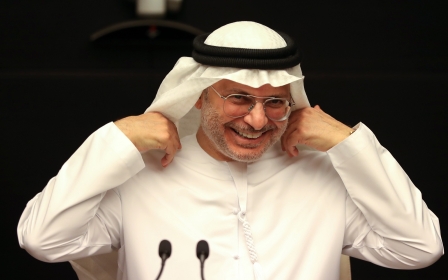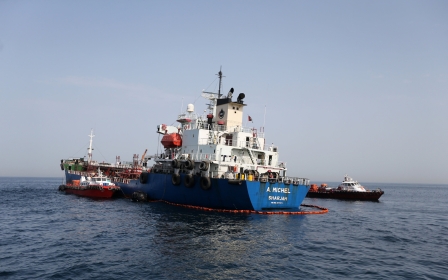Iranian press review: ‘Iran’s Aung San Suu Kyi’ supports more sanctions

Iranians equate Shirin Ebadi to Aung San Suu Kyi
Iranian Nobel Peace Prize laureate Shirin Ebadi has attracted anger after voicing support for tightening the economic pressure on Tehran during a video address at the 7th Annual Iran Accountability Week in Canada.
In response to Ebadi’s comments, Iranians from all walks of life took to social media, comparing her to Aung San Suu Kyi, Myanmar's Nobel Peace Prize laureate turned global pariah, who has failed to act against the massacre of Rohingya people in her country.
One Iranian posted photos of Ebadi and Suu Kyi and wrote: “The main impact of this prize is that the winner sells its soul to the devil.”
Others also compared Ebadi to Maryam Rajavi, the leader of the controversial US-backed Iranian opposition group Mojahedin-e Khalq (MEK).
“Ebadi proved that she is a good substitute for Maryam Rajavi,” one Iranian tweeted.
Ebadi's advocacy for famous political activists in Iran earned her the peace prize in 2003. She has been living in the UK since 2009.
Iran’s main issue ‘is corruption not sanctions’, says economist
Hossein Raghfar, an Iranian economist known for his controversial comments, said in an interview with the Arman daily that the root cause for the current financial crisis in Iran is corruption and not the sanctions imposed by the United States.
Iran's economy is being squeezed by sanctions imposed by the US since Washington's withdrawal from the nuclear deal in May 2018. But rampant corruption has also drained the country’s coffers, further worsening living conditions for ordinary Iranians.
“At this time a group of people [in Iran] are experiencing unprecedented poverty, and another group enjoys an aristocratic lifestyle,” Raghfar told the paper.
“The biggest domestic threat [to Iran] is that its lower social class sees the bare, self-glorification and aristocracy of another class on the streets everyday, and this is a result of the decisions which were made by the governing system.”
Raghfar also said that deepening social issues such as addiction and the brain drain in today’s Iran are silent ways of protesting against the difficulties people face in the country.
Sanctions slow down Iran’s war against international drug cartels
A week after Iran warned that international sanctions may force it to slash a budget allocated to tackle drug smuggling from Afghanistan to Europe, the Etemad newspaper has delved into the consequences of such an action.
On 14 May, former head of Iran’s anti-drug task force Saeed Sefatian told the paper that Europe will be at risk a wave of new drug addictions if Iran relaxes its controls, as large amounts of opiod-based drugs cross through the country.
Iran is located on one of the main three drug-trading routes for heroin that is produced in Afghanistan and smuggled to Western European countries through Turkey and Bulgaria. According to Iranian officials, the country annually spends over $11bn fighting drug smuggling networks inside the country.
Etemad also reported that, since May 2018 and the reimposition of sanctions on Iran, the European Union has stopped aiding Iran financially in its war against the drug cartels.
Sefatian noted that multiple European countries have operated in Afghanistan since the fall of the Taliban, and that those countries have failed to cut opium production.
“Europe doesn't want to aid Iran in the war against Afghan drugs, but it can at least implement preventive measures inside Afghanistan,” he said.
Weekly banned for special anti-war issue
Iran's conservative judiciary system has banned the pro-reformist Seda weekly without giving an official reason. However, sources close to the magazine’s editorial team said that Seda was shut down for its anti-war stances.
The last edition of the weekly was a special issue promoting dialogue with the United States and denouncing attempts by hardliners in Iran and the warmongers in the US for pushing the two countries to the edge of a war.
On 11 May, Seda published an image of a US aircraft carrier fleet on its front page along with the headline: “The Dilemma of War and Peace”. The pro-conservative Fars news agency said that “the aim of publishing such an issue was to spread fear and anxiety” among Iranians.
Since the US has intensified pressure on Iran by forcing the international community to follow its economic policies against Iran, hardliners have gained more power.
The shutdown of moderate and reformist media, new appointments among high-ranking commanders of the elite Islamic Revolutionary Guard Corps (IRGC) and inflicting pressure on political activists in Iran are other measures taken by hardliners in recent months.
* Iranian press review is a digest of reports that are not independently verified as accurate by Middle East Eye.
Middle East Eye propose une couverture et une analyse indépendantes et incomparables du Moyen-Orient, de l’Afrique du Nord et d’autres régions du monde. Pour en savoir plus sur la reprise de ce contenu et les frais qui s’appliquent, veuillez remplir ce formulaire [en anglais]. Pour en savoir plus sur MEE, cliquez ici [en anglais].




